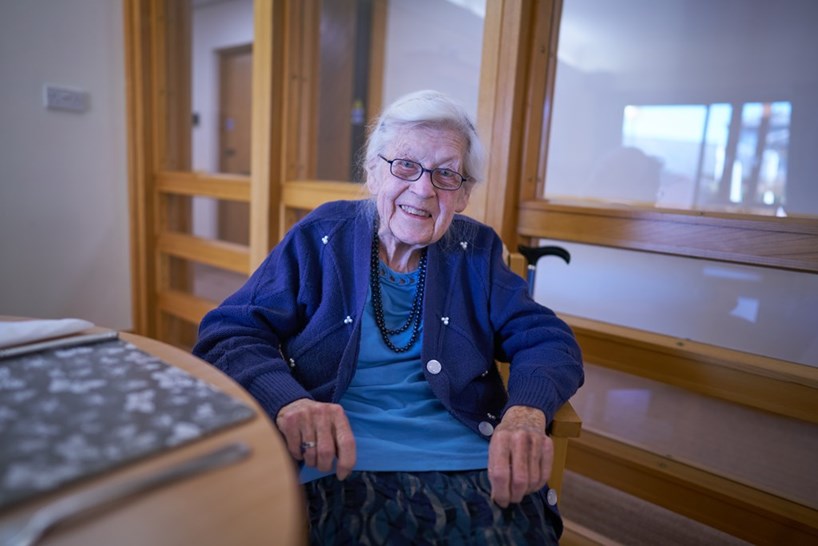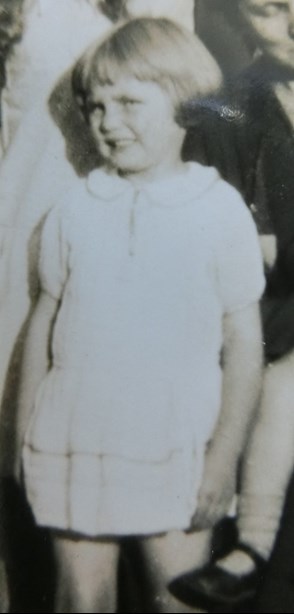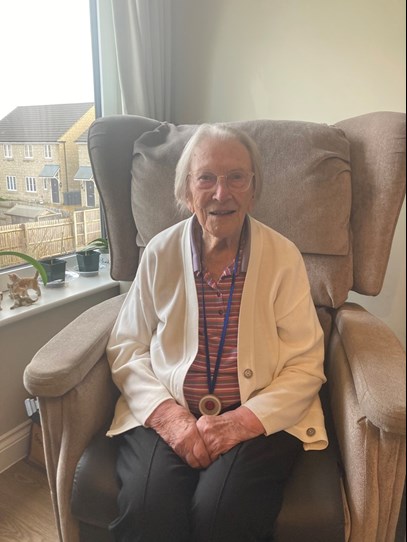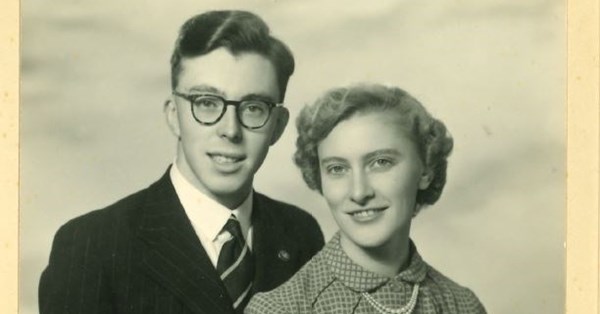THEY are sometimes called the “silent generation”. Of those born in Britain in the years after the First World War, and through the Second, many grew up with ingrained yet quiet faith. Three Christian women, now in their mid-nineties and living in Pilgrims’ Friend Society care homes, talk about their wartime experiences and tell their later life stories, which exemplify the resilience and determination of their times.
Their practical outlook demonstrates how women of their generation rose above the disruption of their lives and education that the Second World War wreaked on them, and to continue to live fruitful lives, built on the faith in which they were grounded.
Dr Eunice Burton, who was born in 1930, vividly remembers seeing a German plane fly past her bedroom window in Hastings. Seconds later, it dropped two bombs, one of which destroyed the house of family friends. “I remember looking up and seeing half the house hanging outside,” she says. She has reflected elsewhere that the solemnity of such a life-and-death experience prompted her to pray, “What must I do to be saved?” and to have received the answer, “Believe on the Lord Jesus Christ and thou shalt be saved.”
Her father was a stretcher-bearer in the First World War. “He was hit in the arm by a bullet and sent back to England,” she remembers. “During that time, his unit advanced, and many of them were killed. That proved to be providential. When I became a doctor, and understood the anatomy of the arm, I realised the bullet had gone between the two bones.” Her father received the Meritorious Service Medal for his bravery.
 Pilgrims’ Friend SocietyEunice Burton
Pilgrims’ Friend SocietyEunice Burton
Her schooling was constantly interrupted, but she spent many happy hours absorbed in the ten volumes of Arthur Mee’s Children’s Encyclopaedia. When “a very wonderful mistress at school” asked her what she wanted to do as a career, she suggested nursing, but, on being told, “I think you have the ability to go on to higher education,” she said, “I’ll do medicine then.”
She left home to study the principles of physics at Norwood Technical College, won the Governor’s Prize, and applied to all the medical schools that would accept women. All rejected her: a lesson of faith which she had to learn, she says, and in which she was spurred on by the preaching of Dr Lloyd Jones, at Westminster Chapel. Later, she transferred to All Souls’, Langham Place, where she remembers the powerful preaching of John Stott.
“You had to concentrate really hard when you were listening to him,” she remembers. “He would fire off multiple-choice questions — one, two, three. They were not repeated.” Brought up by Christian parents to attend a Calvinistic chapel, she was now confirmed as an Anglican.
She got a job at the Hammersmith Hospital Pathological Laboratories, and, at the age of 22, won a science scholarship to the Middlesex Hospital, where she chose to specialise in obstetrics and gynaecology, with the thought that she might serve in a country where a female gynaecologist was required. She acquired more strings to her bow: orthopaedics and plastic surgery, and discovered that she had an aptitude for surgery.
“I like the preciseness of it, and the challenge of the unexpected. You make a provisional diagnosis, you operate with that in mind, and sometimes you find something quite different. You need a lot of courage, and to make sure you aren’t deflected from the job in hand,” she has said.
Female surgeons were rare at the time, and consultancies were hard to come by, but she was appointed to Harold Wood Hospital, in Romford, and, while working there, was invited to help set up a medical school in Basra. She loved the region, returned to northern Iraq to give a lecture tour, and, after retirement in 1995, made repeat visits to the Middle East.
In retirement, she volunteered as a guide at the Hunterian Museum of the Royal College of Surgeons in London, and in the Library at the London Institute of Contemporary Christianity. She moved into her present accommodation in Suffolk in 2017, and, although acknowledging the discomforts of old age and finding walking difficult, considers herself blessed.
Her grandmother had been a Lady Visitor with the Pilgrims’ Friend Society, then known as the Aged Pilgrims’ Friend Society. “I remember accompanying her to see an elderly gentleman, ‘Poor Willie’, in his tumbledown cottage,” she has told the Society. “I little thought that, many years later, I would be a beneficiary myself.”
ESTHER MOYNIHAN was born in Marden, Kent, in 1930, and lived there until she was 11. She has vivid memories of a night during the Battle of Britain when there was an air raid. “A bomb came through the middle bedroom in the front where I was sleeping,” she remembers. “It took out the window, dropped in the garden, and made a big crater.
“Next day, the head of the RAF came down in his chauffeur-driven car. He’d come to look at the crater because he’d never heard of anything like it. For this very important man to do that was extraordinary.” It all happened so quickly that there was no time to be frightened, she reflects. “I did have to be calmed down, but I didn’t have nightmares about it. Some people would call it lucky, but I think we were all watched over. It was really a miracle.”
 Family photoEsther as a child
Family photoEsther as a child
Schooling was intermittent. “We couldn’t always go; so we missed quite a lot,” she says, matter-of-factly. “I stayed at home and looked after my mother, who was an invalid.” Her mother required daily injections. “You could be sitting on the bed 15 minutes giving mum this injection,” she remembers. “And we had to make her coffee with glucose in it.” She rebuffs any suggestion that that it must have been hard for a young girl: she had been lucky to have firm but very loving parents, she says.
Her father was a deacon at the Baptist chapel that the family attended. Some of her best childhood memories are of the beautiful moated house in Bigenden that he inherited as the favourite son, and to which the family moved. “I didn’t know my grandfather, because he died before I was born, but he was very wealthy, and looked after all his sons,” she says.
She was expected to help out with her older sister’s children, and, while engaged with that, joined the tennis club where she met her future husband, Keith, a builder. They were both good players — she had been school champion for two years running — but he was “excellent”, she concedes. She was 22 when they married in a small chapel in East Peckham: two sons and two daughters followed.
She reflects: “I was lucky enough to spend all the time at home with them. I wouldn’t have gone out to work for anything. I loved it, though life was stressful in some ways: one of the boys was under the care of Great Ormond Street Hospital until he was 16, and another had asthma.
“Having had to look after my sister’s children and to think about other people has helped me all my life. Some people feel sorry for themselves, and young people today seem to be constantly on the move. We didn’t have a lot of money, but I can truthfully say I’ve never worried about money. It didn’t bother me. I’ve always had just enough.”
One of her daughters now lives abroad. Esther regularly talks to her via a video link, and thinks nothing of it. “I go to bed and talk to her in New Zealand,” she says, happily. “When I came here, and I took my iPad down into the lounge, I thought everyone would have one. I hope they don’t think I’m showing off! I think they’re missing out, actually.”
She had watched pictures of the solar eclipse on her laptop, where she also joins in with hymns. “It keeps my brain going, what bit of brain I have left,” she says. When people ask her what the secret is for long life, she says without hesitation: “It’s the Lord watching over me. I have felt that all my life, but very particularly as I’ve got older.”
MARY GRIST’s father was the minister of Highbury Baptist Church, in London, and was frequently on fire duty in the area during the war. Now aged 94, she has two outstanding memories: one a miraculous escape for family friends living a couple of doors away. “There was an almighty crash during the afternoon,” she remembers.
“My father said, ‘I’d better see what’s going on,’ and went to investigate. He couldn’t believe his eyes. He opened the door of the house to discover that the rest of it was gone, leaving only the façade. Wonderfully, my friend and her family had had a miraculous escape. They had arranged to move to a safer part of the country, and left just the day before.”
More bizarrely, she recalls what happened after one particular bombing incident. “My father was on the list to give help. He’d gone out one evening to check his patch, and suddenly the door burst open and he said to us, ‘Come and see this!’ We dashed to the front door, and we turned and we looked — and there was a fully grown kangaroo. It had come from one of the town parks, found a gap in the fence of the wall, and just hopped out, followed by a train of keepers.”
 Pilgrims’ Friend SocietyMary Grist
Pilgrims’ Friend SocietyMary Grist
The schools kept closing, and so all the children were told that they would have to evacuate. “The trains and coaches were full — there was a mass exit,” she remembers. “Children would just be taken and told, ‘You go this way, you go that way. . . This mother’s got a spare space. . .’ It was that sort of attitude.
“The difference for us was that we went to my aunt’s house. They lived in Aylesbury, and my uncle was a pastor there. We didn’t know any of the children, and they had no children themselves. My father stayed in London, because it wouldn’t have done for him to have been evacuated when he would be needed there, but it was a very unhappy time for them.”
Although they managed well, the aunt and uncle knew very little about caring for children. Mary remembers, with a degree of impishness, how, when her uncle had a bad head cold, he would blow his nose loudly, and then hold the sodden handkerchief up to the fire to steam it dry in front of them. “And he helped himself to my sweets,” she says in indignation.
When the evacuees came back after two years away, the bombing started. “Friends would be in school one day, and the next day, when we had the register taken, that person wouldn’t be there. We were right in the middle of it in north London.”
She also recalls a “happy story” from the time: “I was going to school as usual, when I met children running, but in the wrong direction, and I couldn’t think what was going on.” It began to make sense, as they were running up the hill away from the school. “‘The school’s been bombed. They’re saying we can all go home,’” she remembers. “So, happily, we all turned around.”
She was 14 when the war finished, and lived at home until she was 18, when the time came for her to think about the future. “There were just two questions: which was I going to be involved in — teaching, or nursing?” she remembers. “I finished up at a teacher-training college in Yorkshire, in the countryside. It was quite a closed shop, but I loved it. It was the happiest time of my life. I didn’t want to go home.”
She went on to teach general subjects, and recalls how hard she and her colleagues worked, making their own resources. She went on to marry and have three children, and her husband, Philip, lives with her in the same care home. She ponders the question whether life is generally better now than it was for her own generation, and says simply: “We had a lot of time when guidance was desperately needed. If you’re following Jesus, he will take care of any need.”














